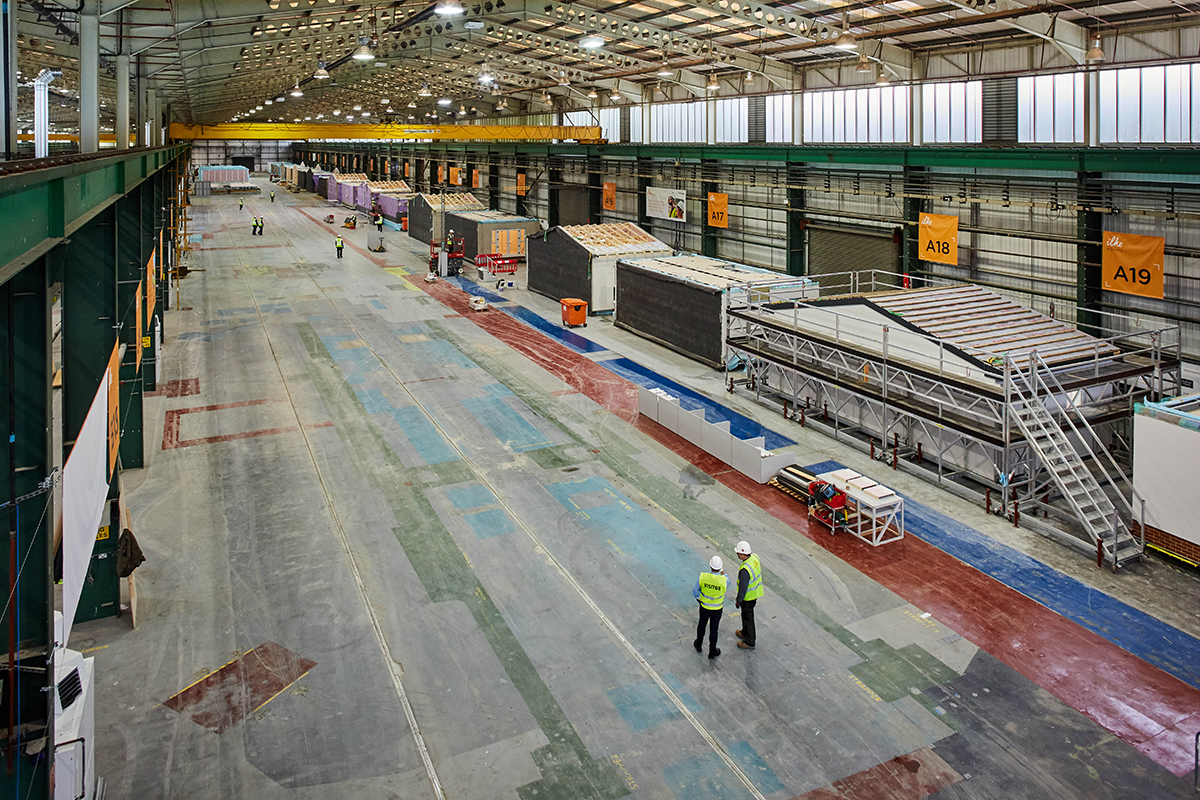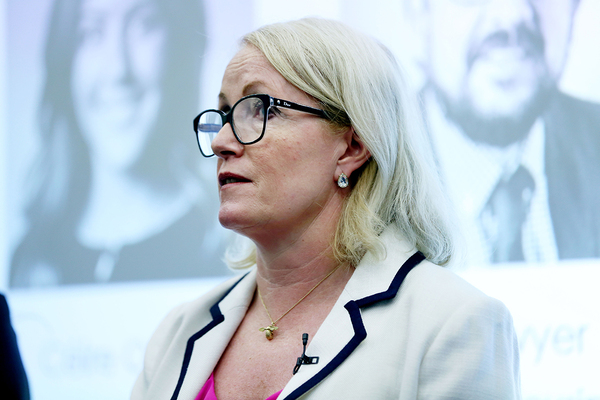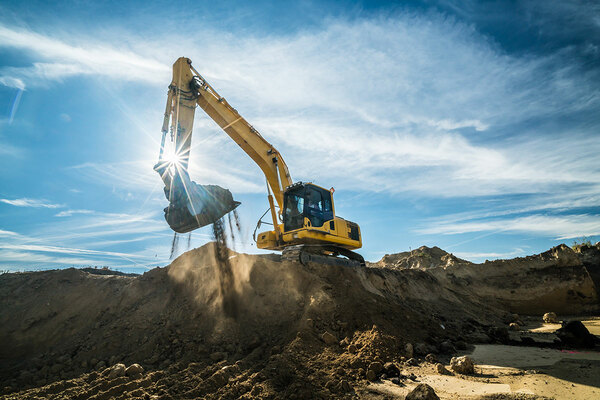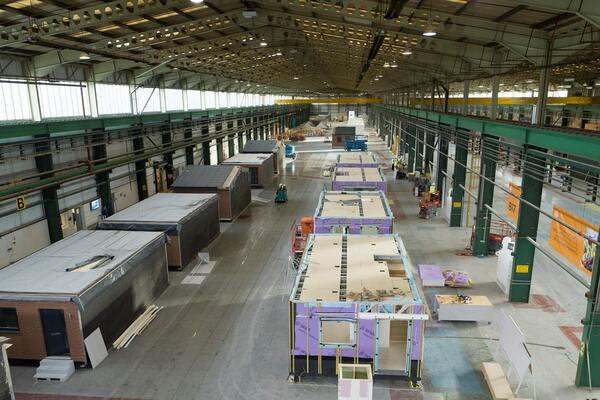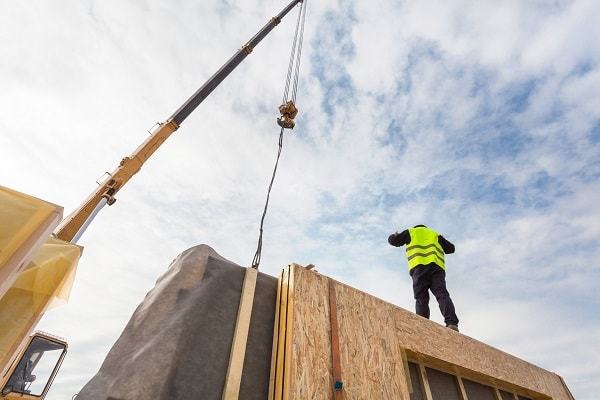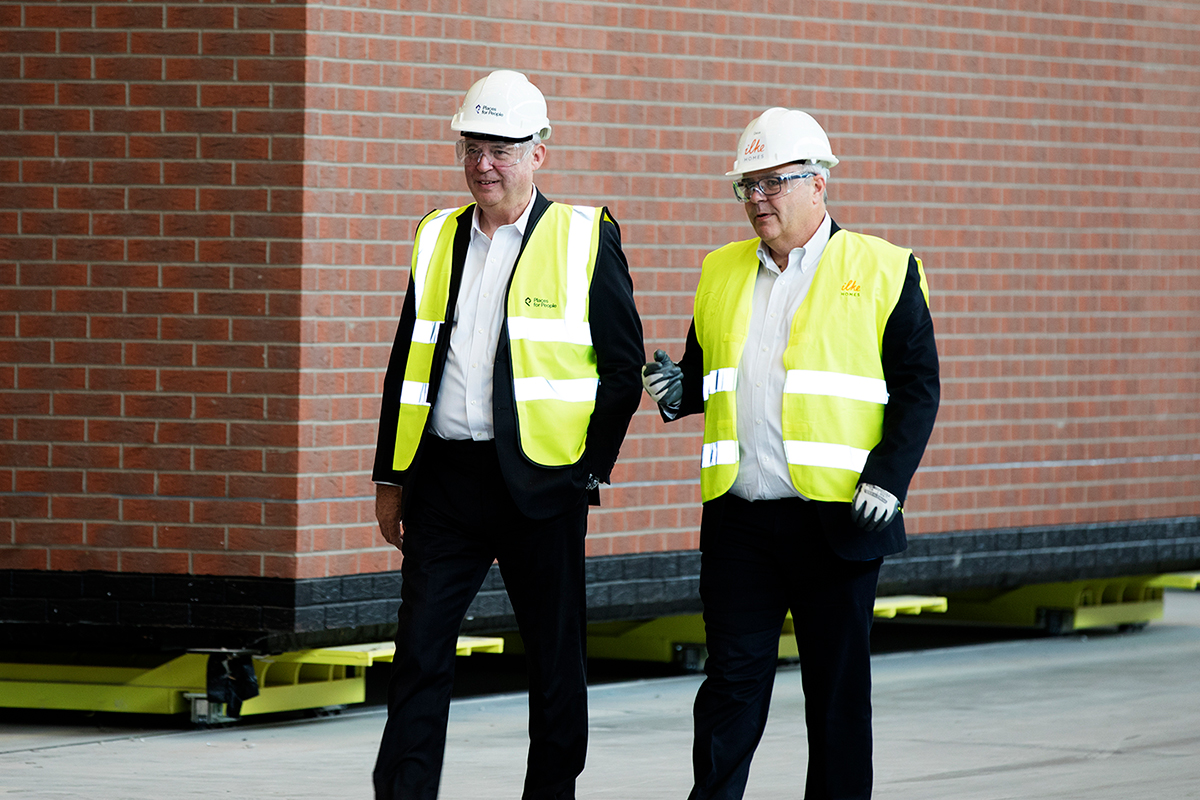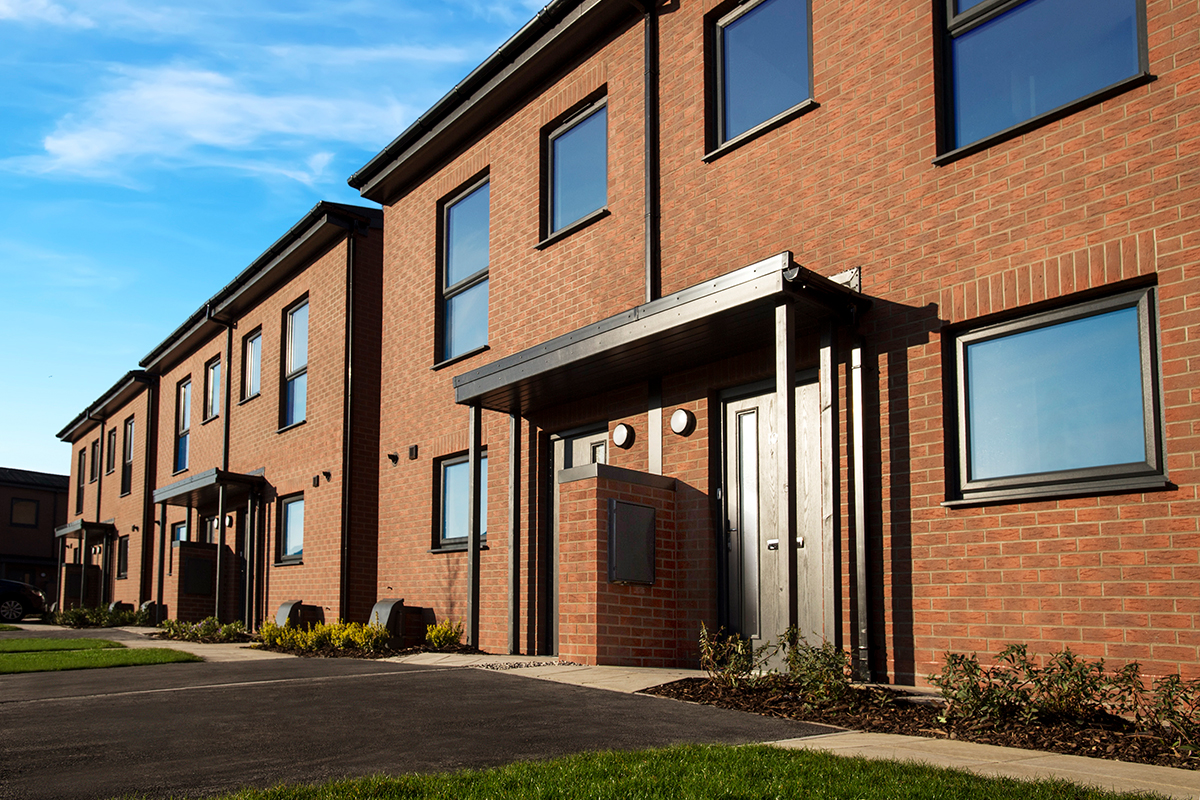You are viewing 1 of your 1 free articles
How Ilke and Places for People aim to make modular mainstream
Modular housing has been around for a few years, but uptake has been slow and small scale in the social sector. James Wilmore heads to North Yorkshire to meet two bosses who want to make it the convention. Photography by Simon and Simon Photography
Inside Ilke’s modular homes factory, where there are 180 employees on the factory floor. In this financial year, the factory will produce 500 units
David Cowans and Dave Sheridan have a lot in common. As well as sharing the same first name, both men hail from the North East of England.
Mr Cowans, chief executive of 198,000-home landlord Places for People, is from Newcastle, and Mr Sheridan, executive chair and current interim boss of modular homes manufacturer Ilke Homes, is originally from Middlesbrough.
The rivalry between their two hometowns is brought up during Inside Housing’s tour of Ilke’s 25,500 sq m North Yorkshire factory.
The magazine is witness to some gentle joshing from Mr Sheridan as he claims his hometown is in some way superior to its North East rival.
That, however, is where the joviality ends. Both men are deadly serious about one thing: making modular housing mainstream.
“There’s a potential housing revolution here and it’s exciting,” declares Mr Cowans in a way that suggests he knows people need convincing.
Understandably, he is keen to talk up modular. Places for People this month placed a healthy bet on factory-built homes, ordering 750 from Ilke in a £100m deal. The two firms have agreed a deal which will see 500 modular homes delivered to sites Places for People has bought. The landlord is identifying sites for the other 250 properties.
The deal garnered headlines, including a feature slot on BBC Breakfast. But Mr Cowans is not getting carried away. “It’s just another milestone on a very long journey,” he admits.
The association has been involved in offsite construction for the past four years, testing modular homes on eight separate sites with various manufacturers. It also has an investment in its own modular factory in Wales, through a company called ModularWise. It is spreading its bets and Mr Cowans does not rule out deals with other suppliers.
So why did Places for People choose Ilke for this grand statement? “We have a long-term relationship with Ilke and the schemes we had we liked. They also have the same vision as us about raising the profile of offsite as a business,” says Mr Cowans.
He says the group has “learned a lot” since being involved, particularly around things such as warranty and manufacturing arrangements, delivery to the site, and making sure it works with groundworks.
Places for People is also keen to be seen as a pioneer. “We wanted to advertise our commitment and support for offsite manufacturing as a principle,” says Mr Cowans. “Somebody has to be first and we were very keen for it to be us.”
Modular housing has, however, steadfastly failed to reach anywhere near the mainstream – despite being around in the UK for many years.
Why does Places for People’s boss think that is? “Anything to do with the built environment takes a long time,” he says. “People are on a trajectory, so [they] question the need to change.” The fact it is a conservative industry is the problem, then? “In some parts it is [a conservative industry] but some people would argue it’s not conservative, it’s proven. I wouldn’t argue with that,” he replies.
Modular homes are also still, rightly or wrongly, dogged by their association with post-war prefab homes. While others have been quick to dismiss this link, Mr Cowans looks at it another way. “Prefabs weren’t necessarily a bad thing,” he argues. “I can show you prefabs that were built in 1945 – they are as sturdy now as they were then. It was the 1970s, that was when the negativity came.”
Ilke’s boss Mr Sheridan is more blunt in his response to critics. “I think they [the critics] have never lived in a modular home and are basing their prejudice on past practice. What we’ve got here is quality engineering with homes that are more thermally efficient and require less maintenance.”
He points out the impressive speed that factory-assembled homes can be built, with units now being pumped out in around 10 days. He is also proud of Ilke’s ‘Buildmark’ from the National House Building Council, which means it had to prove the fire rating of their buildings.
Price has also been a deterrent for some. “Broadly speaking, it’s the same price now,” Mr Cowans argues.
David Cowans and Dave Sheridan
Mr Cowans is keen to move beyond this and talk in a wider context. Indeed, he wants others to follow Places for People’s lead.
“We all have a responsibility to do what we can to increase the amount of housing in this country and we need to do that in all the ways available to us,” he says.
Mr Cowans is not giving up on traditional build, though. “Nobody is saying one method is better than another necessarily.”
His comments are understandable, bearing in mind Places for People also has a joint venture with Barratt Homes for a £500m mixed-tenure development in Milton Keynes.
There is no escaping though that large parts of the sector remain slow in embracing offsite. Industry sources have told Inside Housing that there are still heavyweight housing associations reluctant to get involved. Others have said associations that do embrace offsite do so on a small scale, with the majority of orders coming for pilot schemes.
Would Mr Cowans like to see more buy-in from his fellow landlords? “I’m not interested in criticising anyone else,” he says firmly. “What they want to do is up to them. But we’ve led and it is something we all need to do.”
The offsite sector is not short of major players. Just last month Japan’s biggest house builder, Sekisui House, entered the UK market. But Ilke’s boss does not see this as a threat. “It’s great news, because it shows international players are taking this sector seriously,” says Mr Sheridan.
He brands it a “learning opportunity”, acknowledging the fact that in Japan modular homes have been part of the mainstream housing industry for decades.
But business is business and Mr Sheridan can’t hide his competitive spirit as he says: “We want to be number one though, so it makes us raise our game.”
While he explains Ilke “gets on well” with other modular providers, there is still the sense of a space race.
Just 25 miles south of Ilke’s factory is Legal & General’s 550,000 sq ft facility, which Inside Housing visited in February. There we were struck by a distinct paucity of activity.
A finished Ilke home at Hawthorn Avenue, Hull, for Places for People
The same cannot be said for Ilke, which by comparison is bustling. It has 350 employees, with 180 on the factory floor. This is expected to increase to 520 later this year.
All of this can’t hide the fact that the numbers are still small. Since its launch last year, Ilke’s factory has built around 120 modular homes. In this financial year to next March, it will produce around 500 units. However, Mr Sheridan is keen to stress there is a pipeline of orders for “over 1,200” homes and a potential for 5,000 through prospective clients.
Six of the new guaranteed orders are from housing associations. Another order is from Chesterfield Borough Council, but it is only for 10 homes as the authority dips an initial toe into the modular market.
The government also has its part to play in pushing modular through Homes England funding. “I’m reasonably happy, but any more is always welcome,” says Mr Cowans.
On the subject of politics, Mr Sheridan shrugs off any prospect of having to raise prices, even if a no-deal Brexit transpires, he says: “The only concern on Brexit is the ripple it may have on the economy.”
For Mr Sheridan there are more pressing concerns. As a fledgling business, he has the challenge of steering the business towards a profit. Companies House records show Ilke recorded a loss of £7.7m on a turnover of £260,000 in its first eight months to March 2018. It will register another loss this year. “Loss, loss, profit, that is the trajectory we are on,” he explains.
Ilke’s private equity backers, TDR Capital, he says, have “chosen a long game… and they are great believers in the product”.
Evidence of this appears to be Ilke’s ambition to open more factories soon. A second smaller factory in Yorkshire, aimed at testing prototypes, is slated for later this year. Mr Sheridan adds: “Very quickly we will be looking at factory two if the momentum keeps building. And if we’re getting to 10,000 units, which is the plan, then you’ll need five of these [factories].”
As for Mr Sheridan himself, he remains in charge at Ilke after the exit of chief executive Björn Conway earlier this year. He refuses to say whether he has taken on the chief executive role permanently, but says the firm is “not out in the market” to replace Mr Conway and is currently reviewing the leadership structure.
In the meantime, he has houses to build and clients to keep happy, not least Places for People.
And encouragingly for him, Mr Cowans hints at more work. “I don’t see this as a fixed-term relationship [with Ilke],” he says. “It’ll continue to develop and we’ll learn together.”
